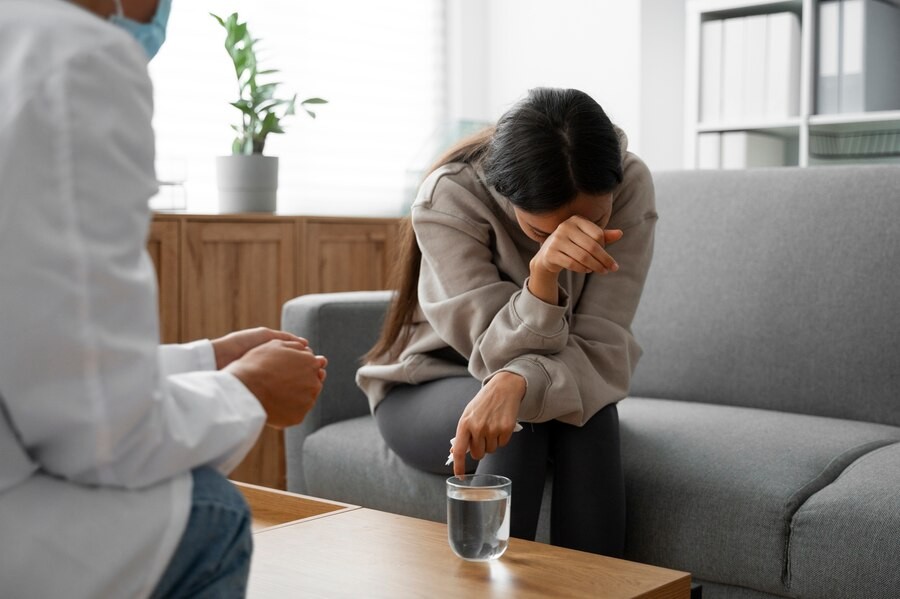Antidepresan adalah obat untuk mengatasi depresi, sebuah kondisi kesehatan mental yang ditandai oleh perasaan sedih, hilangnya minat pada aktivitas yang biasanya disukai, dan gejala lain yang dapat mengganggu kehidupan sehari-hari. Obat ini berfungsi dengan memengaruhi keseimbangan zat kimia di otak, sehingga dapat membantu mengelola gejala depresi.
Namun, penting untuk diingat bahwa tidak semua perasaan sedih atau perubahan suasana hati memerlukan pengobatan dengan antidepresan. Anda perlu memahami kapan sebaiknya menggunakan antidepresan agar penggunaannya efektif dan tepat sasaran.
Kapan Perlu Minum Obat Antidepresan?
Antidepresan bukanlah obat yang dapat dibeli secara bebas. Penggunaannya harus berdasarkan resep dokter agar dosisnya sesuai dan efektif.
Berikut adalah beberapa kondisi yang mungkin memerlukan penggunaan antidepresan:
Depresi
Obat antidepresan biasanya direkomendasikan untuk orang yang mengalami depresi. Kondisi ini ditandai dengan beberapa gejala, di antaranya:
- Sulit berkonsentrasi
- Merasa tidak berharga
- Merasa sedih dan tertekan sepanjang waktu
- Kehilangan minat akan aktivitas yang sebelumnya menyenangkan
- Kesulitan tidur atau tidur terlalu berlebihan
- Penurunan energi dan motivasi
- Munculnya pemikiran ingin menyakiti diri atau bunuh diri
Jika depresi mulai mengganggu kemampuan untuk bekerja, berinteraksi sosial, maupun menjalani rutinitas sehari-hari, maka obat antidepresan mungkin dibutuhkan untuk membantu mengelola gejala tersebut.
Baca Juga: Tanda-Tanda jika Wanita Mengalami Depresi
Gangguan stres pascatrauma (PTSD)
Gangguan stres pascatrauma atau PTSD adalah gangguan mental yang dapat terjadi pada orang yang mengalami atau menyaksikan kejadian traumatis. Gejalanya meliputi:
- Adanya pikiran yang mengganggu (flashback) dari peristiwa traumatis
- Menghindari hal-hal yang dapat mengingatkan pada kejadian traumatis
- Terlalu berhati-hati pada lingkungan sekitar atau bahkan terlalu curiga
- Rasa cemas yang terus-menerus
- Mudah marah
Dokter dapat merekomendasikan pemberian obat antidepresan pada kondisi ini untuk membantu meredakan gejala dan mempercepat proses pemulihan, sehingga penderita PTSD dapat lebih baik dalam mengelola dampak psikologis dari pengalaman traumatis tersebut.
Gangguan makan
Gangguan makan, seperti anoreksia dan bulimia, sering kali memerlukan pengobatan antidepresan untuk membantu mengurangi gejala yang menyertainya.
Obat antidepresan bekerja dengan memengaruhi zat kimia di otak yang berkaitan dengan hormon suasana hati, seperti serotonin, norepinefrin, dan dopamin. Dengan meningkatkan dan menyeimbangkan kadar hormon ini, antidepresan dapat membantu memulihkan suasana hati pasien, yang pada gilirannya mendukung proses pemulihan dari gangguan makan.
Baca Juga: Mengenal Jenis-Jenis Depresi dan Pemicunya
Gangguan kecemasan yang menyertai depresi
Depresi sering kali disertai dengan gangguan kecemasan seperti gangguan panik, gangguan obsesif kompulsif, atau gangguan kecemasan umum. Ketika kondisi ini hadir bersamaan, pengobatan antidepresan membantu mengurangi kecemasan serta gejala depresi.
Jika terapi psikologis saya tidak cukup
Terapi psikologis seperti terapi perilaku kognitif biasanya menjadi langkah awal dalam mengatasi depresi. Namun, dalam beberapa kasus, terapi saja tidak cukup.
Kombinasi antara terapi psikologis dan obat antidepresan seringkali memberikan hasil yang lebih baik, karena obat ini membantu menyeimbangkan zat kimia di otak yang memengaruhi suasana hati.
Namun, penting untuk dipahami bahwa obat antidepresan bukanlah solusi instan. Dibutuhkan waktu beberapa minggu penggunaan sebelum efeknya mulai terasa. Selain itu, bagi sebagian orang, penggunaan obat ini mungkin dianjurkan dalam jangka waktu yang lebih lama untuk mencapai hasil yang optimal.
Penting untuk diingat bahwa keputusan untuk menggunakan antidepresan tidak boleh diambil secara sembarangan. Selalu konsultasikan dengan dokter atau psikiater yang akan mengevaluasi kondisi Anda secara menyeluruh dan meresepkan obat antidepresan jika dianggap perlu.
Dokter atau psikiater juga akan menentukan apakah penggunaan obat antidepresan merupakan langkah yang tepat, dan berapa dosis yang dibutuhkan sesuai dengan keluhan Anda.
Memiliki pertanyaan lain terkait dengan obat antidepresan? Anda bisa berkonsultasi dengan dokter melalui aplikasi Ai Care yang dapat diunduh di App Store atau Play Store.
Mau tahu informasi seputar penyakit lainya? Cek di sini, yah!
- dr Nadia Opmalina
Health Direct (2023). Antidepressants. Available from: https://www.healthdirect.gov.au/antidepressants
Medline Plus (2022). Antidepressants. Available from: https://medlineplus.gov/antidepressants.html
Cleveland Clinic (2023). Antidepressants. Available from: https://my.clevelandclinic.org/health/treatments/9301-antidepressants-depression-medication
Health New Zealand (2024). Antidepressants. Available from: https://info.health.nz/mental-health/mental-health-medication/antidepressants
NIH (2024). Depression. Available from: https://www.nimh.nih.gov/health/topics/depression
APA (2023). Formerly depressed patients continue to focus on negative. Available from: https://www.apa.org/news/press/releases/2023/08/formerly-depressed-patients-negative
Jayne Leonard (2023). How to cope with a depressive episode. Available from: https://www.medicalnewstoday.com/articles/322495












